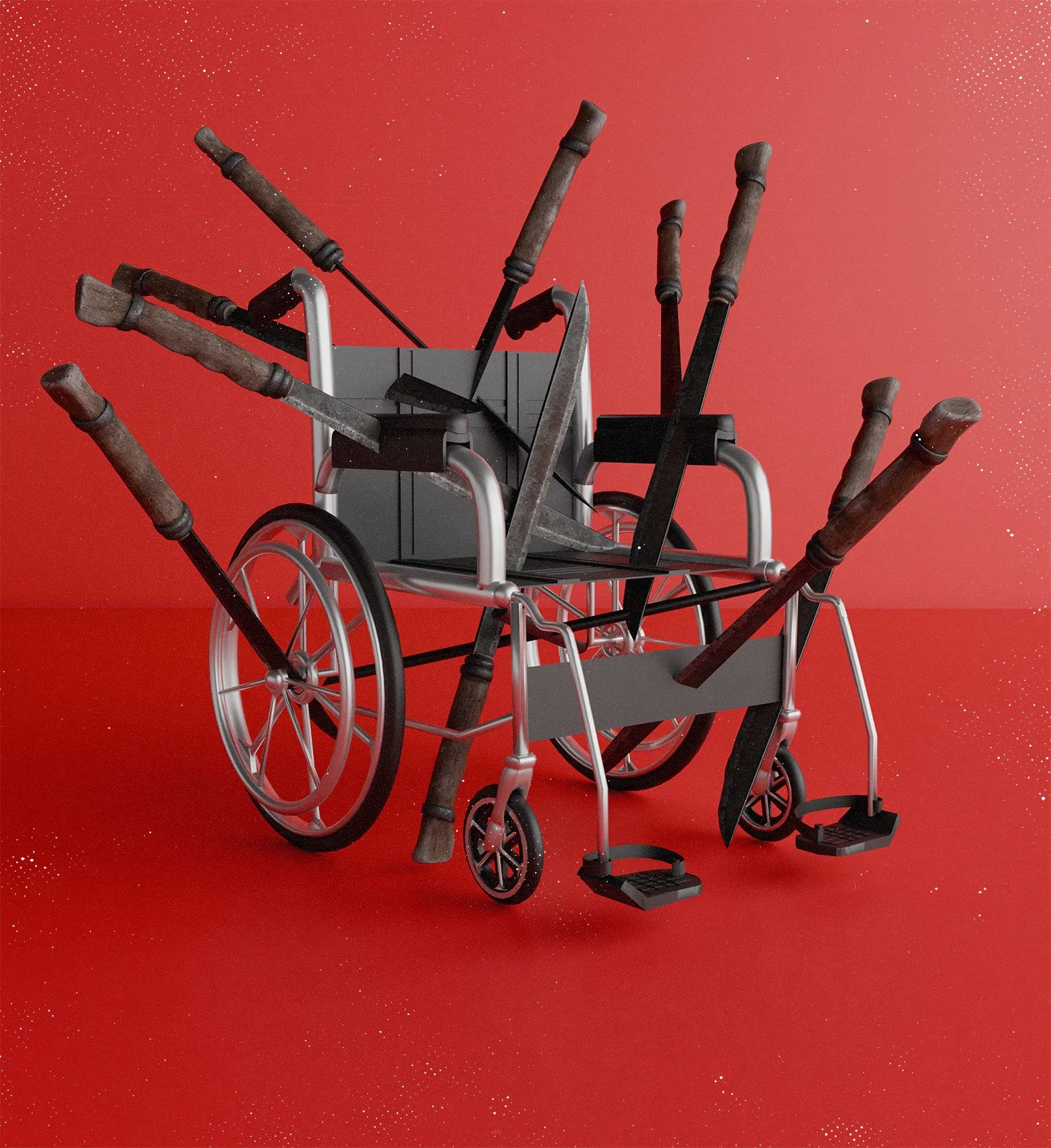The War on Disabled People
My parents brought me to a dingy Council building in Lanarkshire for my first assessment. I’ve been disabled since birth, but prior to turning 16, the questions were directed to my mum and dad as my primary caregivers. Now, as an ‘adult’, according to the Department of Work and Pensions (DWP), I had to endure a 90-minute interview where all aspects of my disability and life were interrogated as if I had committed a crime.
How do you go to the toilet? Do you wipe yourself? Do you have accidents? How bad are they? How do you dress yourself? Do you shower, or wash with wipes? Show me how you put on socks. How often do you tidy your room? Do you eat any vegetables? How depressed are you, really?
When I was 16 years old, a benefit assessor asked me, “Why haven’t you tried to end your life if your disability is ‘that bad’”?
The interview didn’t feel like an attempt to identify the type and level of support I needed. Instead, it felt like an attempt to convince me I was nothing but a massive burden on society. Despite my condition being chronic, with symptoms bound to degenerate, the DWP wanted to make sure that I didn’t suddenly find the power to walk overnight and therefore ‘misuse’ their money.
Even though social security in the UK is amongst the lowest in Europe, the ‘benefit scrounger’ narrative is extremely common. Conservative estimates, however, suggest that the amount under-claimed yearly is around three times as high as the amount over-claimed. So, what accounts for the popularity of this narrative?
Setting minority groups against one another in order to deflect from the root causes of oppression is one of the oldest tricks in the book. Cultivating the narrative of ‘the deserving poor’ vs ‘the undeserving poor’ is just another form of this divide-and-conquer strategy now waged with full force against disabled people. Unfortunately for all of us, it’s extremely effective. Instead of collectively fighting the oppressive systems that create and maintain the barriers in our lives, we are pitted against each other, while the rich and powerful continue to fill their pockets at our expense.
This recent wave of public abuse targeted at “benefit scroungers’ is all part and parcel of the current UK Government’s social security reforms that have shaken the disability community across our islands. These latest cuts, particularly those relating to the personal independence payment (PIP), represent a clear and direct attack on the lives of disabled people. These cuts are not inevitable. In fact, they are not even likely to save the government that much money. The cuts are a choice, and one that will cause significant harm to disabled people, particularly those who rely on this financial support as a lifeline.
What we need to make clear at the end of the day is that capitalist productivity does not equal worth. A disabled person who is unable to work doesn’t deserve less respect than a disabled worker. Each of us has intrinsic worth as human beings that is not tied to our personal economic output. It sets a harmful and dangerous tone when we say that only those who are able to work are worth helping. And we know that many people at work are also struggling to cope. We also know that disability is not the only characteristic that suffers in these conversations.
This way of thinking crawls into every space and corner of society. It also manifests as misogyny, homophobia, racism, classism, transphobia, —you name it. People’s identities, livelihoods, and worth are constantly questioned, tested, interrogated, assessed, and finally deemed:‘worthless’, and ‘a drain on society’.
It’s been a horrific time for disabled people in the UK (but, when has it not been?), with so many people experiencing constant fear and anxiety at the prospect of poverty and destitution —a fear only compounded by the steady growth of the far-right. We’re still waiting on a genuine inquiry into the deaths of disabled people at the hands of the DWP, some of which were documented in John Pring's new book, The Department.
We urgently need to reframe the conversation around the current proposed cuts to recognise that, far from the narratives peddled by certain sections of the press, two million disabled people in the UK are destitute. Even disabled people who are working are struggling, because this world, our countries, our systems, and our attitudes have their roots in misogyny, racism, classism, and ableism.
So, what can we do as disabled people or allies of disabled people?
Governments must listen to the disabled campaign groups and experts warning about the devastating impact these cuts will have. People will no longer be able to afford adaptations, care packages, food, water, heating, and housing. This is not money that we keep in our pockets for fun days out and treats (though, sometimes I do spend money on small treats because I’m human, and disabled people deserve dignity and joy just like anyone else!)
In all our communities, we should review how we respect and care for disabled people, not as a homogenous group of people who are ‘inherently weaker or lesser than’ for their impairments, but as individual people who share the collective struggle against society’s oppressive barriers. This could be in our healthcare settings, in our homes and neighbourhoods, in schools or workplaces. We are going to have to work very hard to replace the narratives that foster division among us with those that emphasise complete solidarity against capitalism and all the oppression it spawns.
Disabled people are everywhere, and we’re not going away. No matter how hard austerity pushes those struggling, they cannot silence our need for independence, respect, dignity, and care. Decision makers should understand that disability is not a fringe issue, but something that touches all of us in one way or another.
There should be nothing about us, without us.
Kayleigh O’Neill worked for disabled people's organisation Inclusion Scotland and charity Euan's Guide, before being elected as a Green Councillor in the city of Edinburgh. She's the first woman in a wheelchair to hold that position.
Your £3/month subscription is used to print 30 copies per issue, worth £90 for our vendors. We went from 1000 copies per issue in 2018 to roughly 40,000 per issue in 2025. The only thing stopping us doing more is money. With your support we can go even further. Help us print and distribute more copies for free to anyone who wants to sell it by becoming a monthly subscriber.

